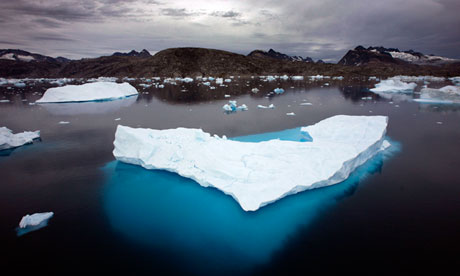Arctic expert predicts final collapse of sea ice within four years
As sea ice shrinks to record lows, Prof Peter Wadhams warns a ‘global disaster’ is now unfolding in northern latitudes

One of the world’s leading ice experts has predicted the final collapse of Arctic sea ice in summer months within four years.
In what he calls a “global disaster” now unfolding in northern latitudes as the sea area that freezes and melts each year shrinks to its lowest extent ever recorded, Prof Peter Wadhams of Cambridge University calls for “urgent” consideration of new ideas to reduce global temperatures.
In an email to the Guardian he says: “Climate change is no longer something we can aim to do something about in a few decades’ time, and that we must not only urgently reduce CO2 emissions but must urgently examine other ways of slowing global warming, such as the various geoengineering ideas that have been put forward.”
These include reflecting the sun’s rays back into space, making clouds whiter and seeding the ocean with minerals to absorb more CO2.
Wadhams has spent many years collecting ice thickness data from submarines passing below the arctic ocean. He predicted the imminent break-up of sea ice in summer months in 2007, when the previous lowest extent of 4.17 million square kilometres was set. This year, it has unexpectedly plunged a further 500,000 sq km to less than 3.5m sq km. “I have been predicting [the collapse of sea ice in summer months] for many years. The main cause is simply global warming: as the climate has warmed there has been less ice growth during the winter and more ice melt during the summer.
“At first this didn’t [get] noticed; the summer ice limits slowly shrank back, at a rate which suggested that the ice would last another 50 years or so. But in the end the summer melt overtook the winter growth such that the entire ice sheet melts or breaks up during the summer months.
“This collapse, I predicted would occur in 2015-16 at which time the summer Arctic (August to September) would become ice-free. The final collapse towards that state is now happening and will probably be complete by those dates”.
Wadhams says the implications are “terrible”. “The positives are increased possibility of Arctic transport, increased access to Arctic offshore oil and gas resources. The main negative is an acceleration of global warming.”
“As the sea ice retreats in summer the ocean warms up (to 7C in 2011) and this warms the seabed too. The continental shelves of the Arctic are composed of offshore permafrost, frozen sediment left over from the last ice age. As the water warms the permafrost melts and releases huge quantities of trapped methane, a very powerful greenhouse gas so this will give a big boost to global warming.”
===========================================
“여름철 북극해 빙하 4년 내 사라질 수 있다”
배문규 기자 sobbell@kyunghyang.com
출처 : 경향신문 입력 : 2012-09-18 21:29:46ㅣ수정 : 2012-09-18 21:29:46
http://news.khan.co.kr/kh_news/khan_art_view.html?artid=201209182129465&code=970100
ㆍ영국 학자 “온난화 가속 탓”… 대륙붕 메탄 분출 땐 재앙
지구 온난화로 여름철 북극해 빙하가 4년 안에 사라질 수 있어 긴급 대책이 필요하다고 빙하전문가가 경고했다. 빙하전문가 피터 워드햄 영국 케임브리지대 교수는 “북극의 여름철(8~9월) 해빙 면적이 최저기록이었던 2007년 417만㎢를 경신해 올해 350만㎢로 줄어들었다”며 “지구 온난화로 겨울철에는 해빙이 과거보다 적게 생성되고 여름철에는 더 많이 녹고 있다”고 밝혔다고 가디언이 17일 보도했다. 워드햄 교수는 북극해에서 잠수함을 통해 얼음의 두께를 지속적으로 측정해 왔으며, 2007년 여름의 빙하 축소도 예측한 바 있다.
워드햄 교수는 “2015~2016년 여름철이면 북극해에서 얼음이 사라질 것으로 보인다”고 밝혔다. 그는 “초기에는 여름철 빙하가 알아채기 어려운 느린 속도로 줄어들어 50년 정도는 얼음이 남아 있을 것으로 생각했다”며 “그러나 마침내 여름철 빙상이 녹거나 부서지는 정도가 겨울에 얼어붙는 것을 넘어섰다”고 말했다.
태양 광선을 반사해 지구 온도를 낮추는 역할을 하는 북극 해빙 면적은 1970년대에 800만㎢였으나 현재는 절반 넘게 줄었다. 미 국립빙설자료센터의 줄리언 스트로브 연구원은 “최근 급격하게 얼음이 녹는 현상은 북극해의 얼음층이 더 얇고 녹기 쉬운 상태로 근본적인 변화를 겪고 있다는 의미”라고 지난 14일 가디언에 밝혔다.
해빙의 감소는 해수 온도를 상승시켜 해저층에도 영향을 미친다. 특히 북극해 대륙붕의 과거 빙하기에 퇴적된 영구동토층이 해수 온도 상승으로 녹으면 엄청난 양의 메탄이 새어나올 수 있다. 주요 온실가스 가운데 하나인 메탄이 대량으로 대기에 방출되면 지구온난화가 걷잡을 수 없이 빠른 속도로 진행되면서 ‘전지구적 재앙’이 될 수 있다는 것이다. 국제환경보호단체 그린피스의 존 소븐 이사는 “해빙이 사라지면 지구 온도를 높여 식량 생산에 영향을 미치고 극단적 기상활동도 초래할 수 있다”고 경고했다.
워드햄 교수는 “기후변화는 더 이상 수십 년간에 걸쳐 어떤 대책을 시행하는 문제가 아니다”라면서 “이산화탄소 배출량을 줄이는 것은 물론 태양 광선을 우주로 돌려보내고 구름을 희게 만들거나 미세한 안개를 뿌려 이산화탄소를 흡수하는 등의 지구공학적 대책들을 추진해야 한다”고 밝혔다. 국제환경보호단체 세계자연보호기금의 데이비드 누스바움 영국지부 회장도 “미래 세대를 위해 기후 변화에 제동을 걸어야 한다”며 “탄소 배출량을 줄여 완전한 재생경제로의 전환 등 모든 조치를 취해야 한다”고 밝혔다.